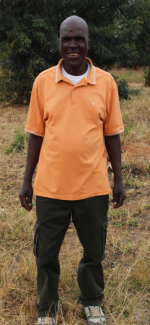Soft Tembo is a 52-year old father of eight children. He lives in the Kapiyo village of Zambia and works primarily in farming but also serves as the chairperson and a volunteer on the Nyawalila Neighborhood Committee. Committees such as these help bring together community perspectives and ensure that local activities meet the needs of the community.
In the past ten years, Zambia has achieved impressive gains in maternal and child health, but it still has one of the highest maternal and infant mortality rates in the world. Like in many countries, one of the main challenges is reaching people in remote communities that sometimes live beyond the direct reach of health facilities. Linking communities with health facilities allows communities to take an active role in the outreach, advocacy, and oversight of health care delivery where they live. Communities are also an important source of information for health facilities on what is working and what different or additional approaches are needed, making the overall health system more accessible for vulnerable populations.
USAID is partnering with the Zambian government to invest in community-based opportunities to drive change. For example, USAID helped Soft gain skills in leadership, governance, gender integration, community health planning and mapping, income generation, and social and behavior change. Soft has used these skills to help his community, saying, “before, we didn’t understand how to run Neighborhood Health Committees, but now, things are progressing.” A Neighborhood Health Committee in the Chipata District noticed that many mothers were not taking their young children to regular check-ups and vaccination appointments because the health facility was too far. The Committee engaged the health facility and encouraged them to provide outreach immunization services. Now, more children are receiving life-saving vaccines.
In 2017, USAID began supporting 25 local, community-based organizations in Zambia to revive and strengthen health committees across 12 districts. To date, these organizations have trained members of 913 neighborhood health committees who advocate for better health outcomes for their communities, including immunization and prenatal care. By prioritizing approaches that drive accountability, efficiency, and government commitment, USAID is partnering with countries like Zambia on their Journey to Self-Reliance.
Download the PDF version of this story. [PDF, 256K]

Photo Credit: Daniel Kanyinji – RICH Petauke
